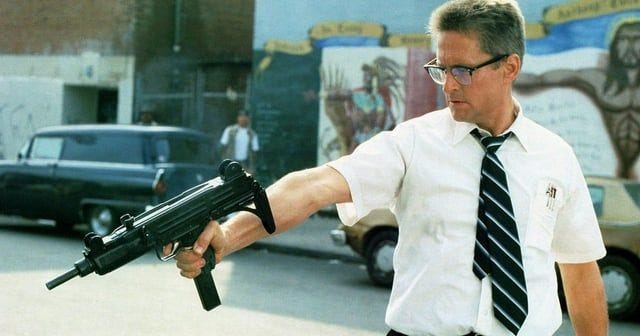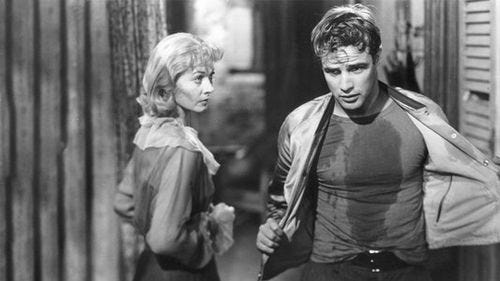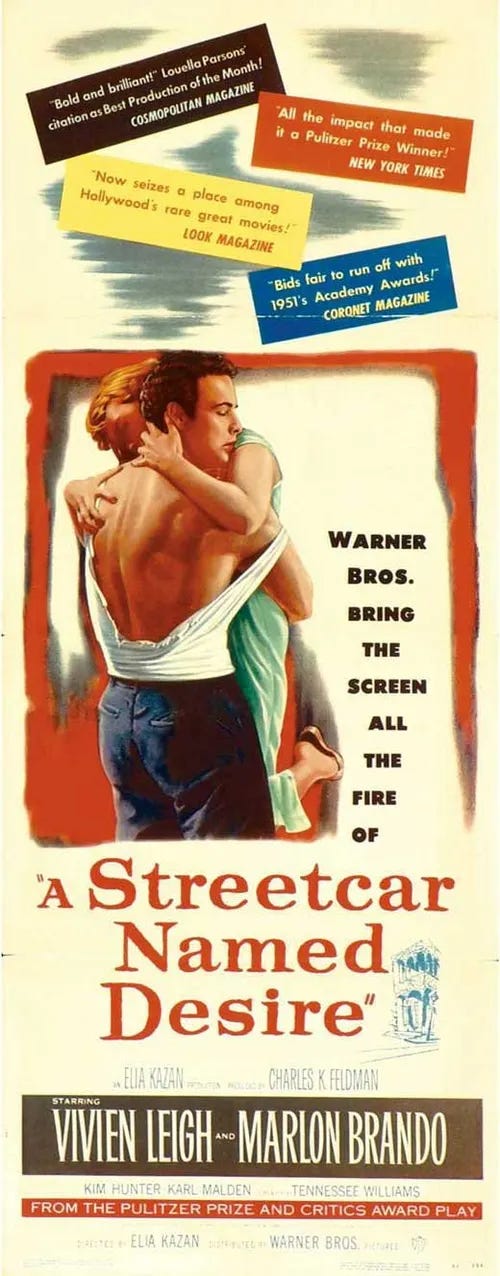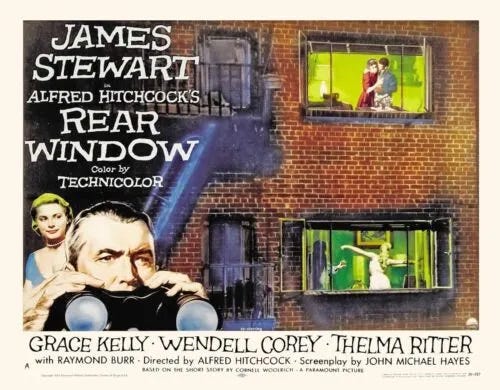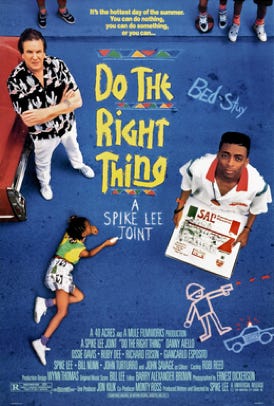There are movies set in hot climates; there are movies where it’s unusually hot for a spell. But then there are movies where the heat rises up like a devil and fills the screen, becoming an actor itself, bewitching the characters who are already in some tense situations, pushing their frazzled nerves to their limits in their sweat-soaked clothes. How will they react? Will they hold onto their better graces, or will they snap? Or perhaps just wilt inside the pressure-cooker?
And you, you lucky bastard, you are sitting in an air-conditioned movie theater or your own house watching all of this punishment wreaked by this merciless miser, and then you realize: oh damn, I have to go out into that hell myself in a spell. How will I react?
In the world of movies, there are two places this tends to occur: New York City, and the Mississippi Delta: the latter courtesy of Tennessee Williams-based screenplays.
In fact, Tennessee Williams has such an outsized presence on this genre that I’ve limited him to one entry this round and have already created a second version of this post devoted exclusively to him. Tune in next summer for that one.
As far as I’m aware, heat has always been an issue most places in the world. Except Scandinavia, where on the whole, they tend to make rather depressing films about being cold and never seeing the sun. Perhaps it’s not a bad things for passions to run hot every once in a while.
It seems that once we got a taste of indoor frigid de-humidified air, thanks to Mr William Carrier in the 1920s, air-conditioning quickly elided from a luxury to a necessity in the US of A/C. By 1955, over 90% of movie theaters were air-conditioned, while private homes hovered around 3%— and most of those were window-rattlers rather than central units. So if you’re sweating in the late 1950s, why not pay the grindhouse fee of two bits (25 cents) for you/and or your kids to see movies all day long?
Not surprisingly when you think about it, the late 50s coincided with major studios shifting their major movie releases to the summer, rather than the previously standard Christmas and Easter-times. Upon further reflection, it is not surprising that movies about heat seemed to have an uptick in the late 50s— with a resurgence in the 80s-90s that focused more on a divide between haves and have-nots. If you’re hot: you have not. Let the haves have it.
But enough of my yapping. Pour yourself a nice, tall, cool martini; put your undies in the icebox; open up the fire hydrant and watch some other poor SOB deal with the ungodly temperatures for a couple hours.
~As always, click on the movie poster for a clip~
Rain (1932)
d. Lewis Milestone
*****
starring Joan Crawford ,Walter Huston, Fred Howard, Guy Kibbee
“This heat’s enough to drive you crazy!”
It’s wet in the jungle, and it’s hot. Place your bet on who will prevail when the immovable object— holier-than-thou Bible-thumper Reverend Davidson (Walter Huston) meets the irresistible force— infamously loose Sadie Thompson (Joan Crawford) while they are both temporarily stranded on the remote Pacific island of Pago Pago during a torrential debilitating downpour. If you’ve never seen young Joan Crawford in her prime, this is the one. And if you’ve never seen young(ish) Walter Huston (father of John and grandfather of Anjelica), this is the one. Those jungle drums will drive most anyone mad, though the natives don’t seem to mind: they’re enjoying the showdown, as should you.
A Streetcar Named Desire (1951)
d. Elia Kazan
*****
starring Vivien Leigh, Marlon Brando, Kim Hunter, Karl Malden
“Oh, this awful heat! It’s like a Turkish bath in here!”
Thus proclaims Blanche DuBois (Vivien Leigh) as she scrambles for excuses to explain away everything: her circumstances, her past, her secret tippling, and why she is forced to live with her mousy sister Stella and her revolting, brutish yet oddly attractive brother-in-law Stanley Kowalski (Marlon Brando). Blanche has always depended on the kindness of strangers, and she now has a gentleman caller, so perhaps life is looking up. Things do tend to get steamy in the French Quarter.
Rear Window (1954)
d. Alfred Hitchcock
*****
starring James Stewart, Grace Kelly, Wendell Corey, Thelma Ritter, Raymond Burr
“You’d think the rain would’ve cooled things down. All it did was make the heat wet.”
Thus quips the ever trenchant Thelma Ritter. FranxFlix’s favorite of all Hitchcock’s movies features James Stewart as LB Jeffries, an adventuresome photographer temporarily homebound in an itchy cast and a wheelchair during the hottest part of the year, with nothing to do but watch the goings-on in his neighbors’ windows. Is it his imagination, or does he witness something nefarious? Luckily he has the oh-so-cool-as-ice Grace Kelly by his side to sort things out, whether he likes it or not.
The Seven Year Itch (1955)
d. Billy Wilder
****
starring Tom Ewell, Marilyn Monroe, Evelyn Keyes, Robert Strauss, Victor Moore, Carolyn Jones
“You know what I do? I keep my undies in the icebox and the gin in the refrigerator!”
The opening scene, done in quasi-documentary form, explains the annual New York City ritual of married men shipping their families off to the mountains or beach to spare them the unbearable August urban heat. The ritual has the added bonus of leaving the men in a city inhabited by young working women, such as “The Girl” (she never gets a name) played by Marilyn Monroe, who has moved into the apartment above Richard Sherman (Tom Ewell), who happens to be going through the “seven year itch”… that impulse to stray that married men start to feel after a while. In more ways than one, Sherman’s spirit is willing but the flesh is weak. This is the movie of Marilyn’s famous skirt-blowing over the subway grate scene, which drew such crowds as it was filmed that it caused Joe DiMaggio to reconsider his marriage to the world’s most famous sex symbol.
12 Angry Men (1957)
d. Sidney Lumet
*****
Henry Fonda, Jack Warden, E G Marshall, Lee J Cobb, Ed Begley, Jack Klugman, John Fiedler
“This fan don’t work worth a damn. It’s like an oven in here.”
Nothing like pulling jury duty in the middle of summer, amirite? Luckily this is a simple case: clearly the boy pulled that unique switchblade knife and killed his father, as witnessed by several people. C’mon guys, this is the hottest day of the year in a room without air-conditioning, let’s just call him guilty and get out of here! Juror #7 (Jack Warden) certainly thinks so- and he has tickets to the Yankees game, so let’s get on with it, already! Unfortunately, Juror #8 (Henry Fonda), who seems oblivious to the heat in his linen suit, thinks they should talk it out. And then Juror #9, in the seersucker jacket, agrees…and the outcome isn’t so clear. Along the way we get a panorama of what it means to be a citizen, what witnesses can be trusted, and the variety of motivations your “peers” may have, in and out of a jury box. Never preachy, always riveting; this is easily a Top Fifty FranxFlix movie.
1776 (1972)
d. Peter Hunt
****
William Daniels, Howard DeSilva, Ken Howard, Blythe Danner
“Someone oughta open up a window…”
“No, no, no! Too many flies, too many flies!”
”But it’s hot as hell
In Philadel-phia!”
Indulge me here: this has been a personal favorite since I first saw it the year of the Bicentennial. It’s one of the last great musicals in that dying genre, and it’s about. . . the writing and signing of the Declaration of Independence?! Yes. It was Jack Warner’s (you know, the last of the Warner Bros.) last production. The congressional delegates bicker about almost everything, but are united by one cause: their hatred of “obnoxious and disliked”John Adams (the excellent William Daniels). The first half is full of witty, catchy songs; the second half turns quite somber as they debate striking the reference to slavery in Jefferson’s original draft. The screenplay takes quite a few liberties with historical figures (poor Richard Henry Lee is reduced to a buffonish popinjay, and James Wilson of Pennsylvania was pretty much the opposite of his portrayal) but playwright/screenwriter Peter Stone knew what he was doing: this was an amateur passion project he wrote while teaching high school history. Much of the dialogue consists of actual quotations from letters and writing, delightfully intermixed with ribald insults. Admittedly not for everyone, but give it a go.
Dog Day Afternoon (1975)
d. Sidney Lumet
****1/2
Al Pacino, John Cazale, Charles Durning
“It’s so damn hot in here, I can’t breathe.”
A bank heist goes wrong, but the perpetrators (not the brightest of criminal masterminds, played by Al Pacino and John Cazale) take advantage of the situation to the best of their abilities by taking hostages and garnering sympathy from the public as they negotiate an exit. Based on a true story that was fresh in the minds of the viewing audience, method actor Pacino waffled over playing a homosexual but once he committed he gave it his all, as always: there’s a strong argument to be made that this was his best role ever, as well as that of his Godfather compadre Cazale (you know him as Fredo). Fun fact: the final scene was shot in 40 degree weather, so the makeup artists designed glycerine for the actors to look sweaty, but director Lumet insisted on applying it himself because the makeup artists tended to overdo things when left to themselves.
Body Heat (1981)
d. Lawrence Kasdan
****
William Hurt, Kathleen Turner, Richard Crenna, Ted Danson, Mickey Rourke
“You can stand here with me if you want, but you’ll have to agree not to talk about the heat.”
Lawrence Kasdan set out to make a modern film noir, and he succeeds brilliantly - perhaps a little too brilliantly. All of the classic tropes are here: down-on-his-luck womanizing lawyer Ned Racine (William Hurt in his second film); femme fatale Mattie Walker (Kathleen Turner, in her film debut); her loathsome wealthy husband (Richard Crenna) who stands between them and a fortune; rat-a-tat dialogue; and there’s even a significant fedora. The heat is mentioned in various ways throughout the film as a metaphor for the pressure on our anti-hero and his “hot” girlfriend (at one point she mentions that her body temperature is higher than the standard 98.6). Mickey Rourke has a great role as one of Ned’s underworld contacts, and pre-Cheers Ted Danson is wonderfully goofy as a lawyer in a wig and thick glasses. Note: This is NOT a family-friendly film: it’s called Body Heat for a reason, and in the 80s, an R-rating was essentially soft-porn.
Do the Right Thing (1989)
d. Spike Lee
****
Danny Aiello, Ossie Davis, Spike Lee, Ruby Dee, Giancarlo Esposito, John Turturro, Martin Lawrence, Rosie Perez, Samuel L Jackson
“The forecast is: IT’S HOT!”
New York City was simmering with racial tension in the 80s after the Howard Beach Bernie Goetz, and Tawana Brawley incidents, and Spike Lee pulls no punches in portraying the unease of the different ethnicities (black, white, Latino, Korean) warily living side-by-side in the Bedford-Stuvesant neighborhood of Brooklyn, when things finally boil over on the “hottest day of the year.” So many critics focus on the social/racial implications that they overlook the best parts: the fact that every shot is visually stunning ; the knife’s-edge balance between humor and tragedy; the everydayness of living one heatwave away from apocalypse. Thirty+ years on, one question lingers: what is the right thing, and did anyone do it?
Falling Down (1993)
d. Joel Schumacher
****
Michael Douglas, Robert Duvall, Barbara Hershey, Tuesday Weld
“Goddamn heat.”
Sitting still in traffic only to have your air-conditioning go out…what else can you do but go on a vigilante shooting spree? You know you’ve contemplated it. Michael Douglas lives out the fantasy, but it’s complicated. At some point you wonder if you should be rooting for this guy who, as some critic said, is only two or three bad luck turns away from you and me. The highlight of the movie is when Douglas says, “Wait, I’m the bad guy?” Well, yes. But you’re not the only one. That might be me tomorrow. (In a better shirt, I hope. But that’s part of the pain, isn’t it.)
Hey - it’s too darn hot. We all complain about it, and anyone can fold under pressure. But let’s end on a high note about what a heat wave can bring: Take it away, Marilyn! She certainly can… can-can.







